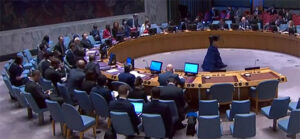Special to WorldTribune.com
 By John J. Metzler, October 3, 2022
By John J. Metzler, October 3, 2022
Amid a swirl of ongoing and upcoming international crises, the Ukraine war overwhelmingly dominated debate at the United Nations General Assembly. Most speakers decried Vladimir Putin’s widening war against Ukraine and equally viewed the dangerous regional and global ramifications from this European conflict which could see Moscow’s use of nuclear weapons.
UN Secretary General Antonio Guterres prefaced the week long debate with a gloomy assessment; “The General Assembly is meeting at a time of great peril…. Geo-strategic divides are the widest they have been since at least the Cold War. They are paralyzing the global response to the dramatic challenges we face.”

He later warned delegates from the 193 member states, “A winter of global discontent is on the horizon.”
U.S. President Joe Biden made the case bluntly, “A permanent member of the United Nations Security Council invaded its neighbor, attempted to erase a sovereign state from the map.”
He added, “This war is about extinguishing Ukraine’s right to exist as a state, plain and simple, and Ukraine’s right to exist as a people.”
French President Emmanuel Macron passionately presented his argument against Russia, “We need to make a simple choice,” he said. “That of war or that of peace.” He said that Russia, “through an act of aggression broke the collective security” by invading Ukraine. Macron stated clearly, “Those who are keeping silent today are in a way complicit with the cause of a new imperialism and a new order.”
Germany’s Chancellor Olaf Scholz stressed, “The world ‘must not stand idly by when a major nuclear power, armed to the teeth, a founding member of the United Nations and a permanent member of the UN Security Council, no less, seeks to shift borders through the use of violence.”
The Chancellor added that the war is leading to rising prices, energy scarcity and famine.
Strong political support and solidarity for Ukraine exists in Europe nonetheless despite Russia’s thuggish energy threats to Germany and much of Central Europe.
Though the majority of speakers decried Russia’s breach of international law and peace by invading a sovereign Ukraine, and equally warned of the dangerous conflict spillover into Europe and the nuclear weapons dimension, very few mentioned the millions of Ukrainian refugees who have fled into neighboring countries such as Poland and Hungary.
Hungary’s President Katalin Novak stressed, “Since the beginning of this conflict, Hungarians have stood with the victims,” she stated, explaining that the country is implementing its largest humanitarian operation in recent history, providing aid to Ukraine as well as shelter to nearly 1 million refugees.
Clearly the economic ramifications of the Ukraine war extend far beyond Europe. Ghana’s President Nana Akufo-Addo asserted, “Every bullet, every bomb, every shell that hits a target in Ukraine, hits our pockets and our economies in Africa.”
Ukrainian President Volodymyr Zelensky in a video address to delegates energized the Assembly with a dramatic speech, “A crime has been committed against Ukraine, and we demand just punishment. The crime was committed against our state borders, the crime was committed against the lives of our people. The crime was committed against the dignity of our women and men.”
Zelensky presented a “Crime and Punishment” legal indictment of Russia. He asserted, “When one country tries to steal the territory of another state, it puts all world nations under attack. Global security cannot be restored without restoring the territorial integrity of the nations which suffered the armed aggression.”
Naturally Russia presented a substantially different view of the conflict with its border state, claimed that the Kyiv government had threatened the Russian ethnic minority. Sergey Lavrov, Russian’s Foreign Minister, charged Russophobia had reached unprecedented proportions, with Western powers making no secret of their ambition to militarily defeat Russia.
Zuzana Čaputova, Slovakia’s President added, “The democratic world and all of us must be a voice of Ukraine, the voice that won’t be silent, a voice that will continue to testify about Russia’s crimes in Ukraine.”
Then there’s a contrarian view. Serbian President Aleksandar Vucic quipped, “Everything we are doing here today seems impotent and vague. Our words make hollow and empty echo comparing to the reality we are facing. And that reality is such that no one is listening to anyone here, no one strives towards real agreements and to resolving problems, and almost everyone takes care only of their own interests.”
Dangerous political currents are swirling through the Assembly session this year as delegations speak almost nonchalantly about weapons shipments and a wider conflict in Europe. Has diplomacy reached an impasse?
John J. Metzler is a United Nations correspondent covering diplomatic and defense issues. He is the author of Divided Dynamism the Diplomacy of Separated Nations: Germany, Korea, China (2014). [See pre-2011 Archives]
